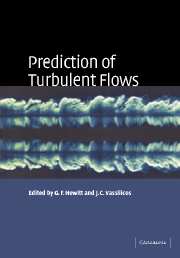Book contents
- Frontmatter
- Contents
- 1 Introduction
- 2 Developments in the understanding and modelling of turbulence
- 3 RANS modelling of turbulent flows affected by buoyancy or stratification
- 4 Turbulent flames
- 5 Boundary layers under strong distortion: an experimentalist's view
- 6 Turbulence simulation
- 7 Computational modelling of multi-phase flows
- 8 Guidelines and criteria for the use of turbulence models in complex flows
4 - Turbulent flames
Published online by Cambridge University Press: 12 August 2009
- Frontmatter
- Contents
- 1 Introduction
- 2 Developments in the understanding and modelling of turbulence
- 3 RANS modelling of turbulent flows affected by buoyancy or stratification
- 4 Turbulent flames
- 5 Boundary layers under strong distortion: an experimentalist's view
- 6 Turbulence simulation
- 7 Computational modelling of multi-phase flows
- 8 Guidelines and criteria for the use of turbulence models in complex flows
Summary
Introduction
Over 80% of the world's energy is generated by the combustion of hydrocarbon fuels, and this is likely to remain the case for the foreseeable future. In addition to the release of heat, this combustion is accompanied by the emission, in the exhaust stream, of combustion generated pollutants such as carbon monoxide, unburnt hydrocarbons and oxides of nitrogen, NOx. The former two quantities arise as a result of incomplete combustion, whereas NOx is formed from the reaction of nitrogen present in the air or fuel with oxygen, usually at high temperatures. An unavoidable outcome of the burning of hydrocarbon fuels is the formation of carbon dioxide, CO2, which is a ‘greenhouse’ gas that may contribute to global warming. While the amount of carbon dioxide generated depends on the fuel burnt, any improvements which can be achieved to combustion efficiency will clearly contribute to an overall reduction in the emissions of CO2. Because of the growing need to reduce the emissions of combustion generated pollutants and improve combustion efficiencies, there is increased interest in accurate methods for predicting the properties of combustion systems. The combustion in the vast majority of practical systems is turbulent and this poses a number of difficulties for prediction. The development of accurate methods for predicting turbulent combusting flows remains a largely unresolved problem which continues to attract a large number of researchers.
- Type
- Chapter
- Information
- Prediction of Turbulent Flows , pp. 128 - 162Publisher: Cambridge University PressPrint publication year: 2005



